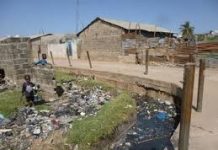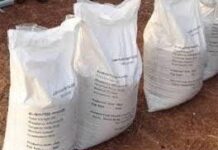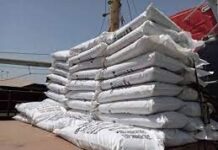Abdoulai G. Dibba
The Food and Agriculture Organisation, FAO, the Global Environment Facility, GEF, in collaboration with the Ministry of Agriculture, on Wednesday 18th October 2017, at a local hotel in the Senegambia area opened an inception workshop for Adapting Agriculture to Climate Change.
The project, is being funded by GEF to the tune of US$6.3 million (equivalent to D277 million).
In her opening statement, the FAO Country Representative Perpetua Katepa Kalala, said Adapting Agriculture to Climate Change Project seeks to strengthen Government’s efforts towards better responding to the climate risks, promote adaptation measures at the local level to reduce risks to economic losses and diversify and strengthen livelihoods and their sources of income.
She said the project aims to reduce climate change risks and vulnerabilities in a cost-efficient way to deliver adaptation benefits and that the project will follow the results based management and programmatic approach of GEF/LDCF in addressing climate change adaptation on the ground.
The FAO representative stated that the project is funded in the sum of USD6,288,356.00, and will be implemented over a four-year period in ten (10) districts covering three administrative regions comprising three agricultural regions.
She said the project will be intervening in the following regions and district:
- Five districts in the North Band Region namely- Upper Niumi, Jokadu, Lower Baddibou, Central Baddibou and Sabach Sanjal.
- Three districts in Central River Region North namely- Upper Saloum, Niani, and Sami
- Two districts in Upper River region North namely- Wuli and Sandu
The FAO Country Rep. stated that these are some of the areas where adverse climate event is highly endemic compared to other regions in the country.
According to the FAO representative, the project is estimated to benefit 2,500 farm households or 20,000 farmers through community gardens, 250 households or 2000 farmers with knowledge on value addition, 50 households or 400 farmers with honey production and 30 poultry producer associations of which 70% are women beneficiaries.
She indicated that the project will support the National Agricultural Research Institute (NARI) to conduct research activities, to release and distribute drought tolerant crop varieties of findi, cassava, sweet potato and dual purpose cowpea in all 10 districts directly benefitting 1,500 households or 12,000 farmers.
“Distinguished ladies and gentlemen, livestock is another very important component and is equally dear to the FAO and occupies center stage in our programs and activities. In that case, the project will establish 10 deferred grazing areas. One in each intervention district, reseed with multi-purpose grass/legume species” she stated.
Also the FAO Country Rep. said the project will establish 10 intensive feed gardens, with one in each district, as well as 6 livestock watering points in the 3 regions.
“Our livestock particularly during the dry season in some instances, trek more than five (5) kilometers daily to get to fresh water points, the toll of which on their health and security is high leading perhaps to poor production of both meat and milk,” she said.
On his part, the Minister of Environment, Climate Change and Natural Resources Lamin B. Dibba, said the unregulated and non-sustainable use of the natural resource base, has negatively impacted on the natural wealth of the country.
He said the negative impacts include loss of forest cover, declining fish stocks and sizes, decreasing biological diversity leading to increase by-catch of marine mammals with resultant poverty, extinction and habitat degradation.
“The impact of climate change has emerged as one of the most significant external factors hindering the performance of growth driving sectors, especially agriculture, tourism and industry, which have the greatest impact on the economy,” stated the Environment Minister.
He pointed out that due to the increasing manifestations of climate change in the form of drought, flood, soil degradation, coastal erosion, erratic rainfall patterns and global warming, the Gambia has experienced poor yields, pest and disease incidences, infrastructural damages and even loss of lives in extreme cases.
“Climate change and variation, places a major burden on inclusive growth and ultimate national development because the productive base of the economy thrives on climate-sensitive activities,” he stated.
Mr. Dibba pointed out that the Gambia is experiencing the negative impact of climate change and global warming, charactized by a noticeable increase in mean annual temperature from 25.8 degree in 1947 to 32.6 degree in 2010.
Similarly, he went on to say that average relative humidity, has also been decreasing since the 1940s, with annual change induced windstorms and flash floods which are increasing in strength and severity and causing damage to property in the Gambia.
Considering the threats and potential impacts of climate change he said, Government has adopted a comprehensive strategy to adopt to and mitigate against the impact of climate change.
“During the PAGE 2012-2015 period, a climate change priority Action Plan estimated at US$47 million, was developed and many projects were implemented including (a) mainstreaming of climate change into the education curricula, (b) development of climate change policy and strategy and (c) the development of a low Emissions Climate Resilient Strategy,” he concluded.
In his opening statement, the Minister of Agriculture Omar Amadou Jallow stated that Government under the dynamic and able leadership of Adama Barrow, is fully cognizant of the effects of climate change on agriculture and the wider economy.
He said the increase frequency and severity of climate-related hazards are having a noticeable impact on the performance of agriculture in the Gambia and the economy.
Mr. Jallow pointed out that since 2010, the Gambia experienced droughts in 2011, 2014 and 2015 as well as devastating floods and windstorms in 2012 and 2016, that led to major losses in crop and livestock and even lives in the affected areas.
“Droughts, floods and increases in temperature, reduce the ability to grow crops, as well as it affects other aspects of the value chain (e.g. drying/storage and transport to market)” stated OJ.
Continuing his opening statement, the Agric. Minister stated that institutional support services are affected by inadequate technical capacity to transfer appropriate technologies to address the impacts of climate change.
“Agribusiness and agro-processing are not properly connected with production oriented support at the local level, and market opportunities are not easily known or accessed by small producers,” he said.
Because of the complex challenges described above, he went on to say, the household food insecurity has exacerbated the prevalence of malnutrition which is particularly affecting the most vulnerable population in the country.





















